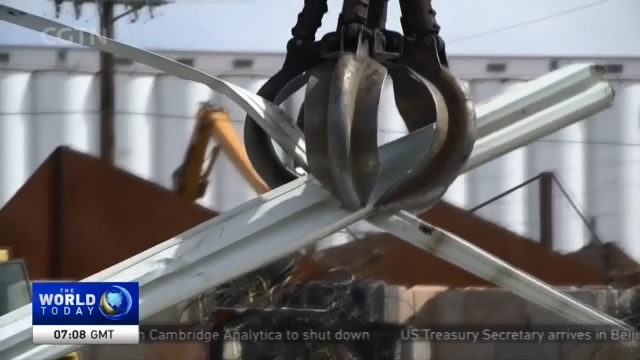
16:40, 03-May-2018
China-US Trade: China's 25% tariff on aluminum scrap hits US recycling industry
02:53

Scrap commodities are one of the few industries where the US runs a trade surplus with China, but it could be hit hard by new tariffs on aluminum scrap. CGTN's Hendrik Sybrandy reports.
Brian Henesey is a rolling billboard for recycling. Take a tour of Rocky Mountain Recycling, which he runs, and you'll see huge mounds of aluminum scrap, one of the materials that leaves this yard bound for customers around the world.
BRIAN HENESEY, GENERAL MANAGER, ROCKY MOUNTAIN RECYCLING "At the end of the day, recycling old stuff keeps it out of the landfills, you don't have to mine virgin, don't have the greenhouse gas."
More than half of this material is destined for export. And, according to the scrap recycling trade group, more than half the U.S. aluminum scrap sent overseas last year, $1.1 billion worth, went to China.
BRIAN HENESEY, GENERAL MANAGER, ROCKY MOUNTAIN RECYCLING "It's a global consumer. One of the largest consumers of recycling material in the world."
On April 2nd, China retaliated against U.S. tariffs placed on steel and aluminum, and included U.S. aluminum scrap metal on a list of products suddenly becoming 25 percent more expensive. That's left many in the industry quite concerned.
JOE PICKARD, INSTITUTE OF SCRAP RECYCLING INDUSTRIES "Extremely, extremely. The scrap industry right now unfortunately is kind of caught in the middle in some of these trade disputes that we're currently seeing."
Joe Pickard with the Institute of Scrap Recycling Industries says the tariff will cause some Chinese manufacturers of cars, beverages and other products to use primary or new aluminum instead, which he says is 90 percent more energy-intensive.
JOE PICKARD, INSTITUTE OF SCRAP RECYCLING INDUSTRIES "When you impose trade barriers, that can dis-incentivize recycling and unfortunately more material can be sent to landfill and that's the last thing we want to see."
HENDRIK SYBRANDY, DENVER "He predicts the tariff will force many Chinese scrap buyers to look for other suppliers, and U.S. suppliers to hunt for new markets. Bringing a period of uncertainty, which the industry doesn't like."
BRIAN HENESEY, GENERAL MANAGER, ROCKY MOUNTAIN RECYCLING "It can affect price, it can affect destination, it can affect material flow."
More than a half a million people in the U.S. work in the scrap recycling industry, directly or indirectly. Some of those jobs could be affected by what began as a U.S. move to re-balance trade between the two countries. Official U.S. figures put the trade deficit with China at 375 billion dollars, though President Trump sometimes inflates the figure.
Trump: "504 billion dollars." Which is ironic, Pickard points out.
JOE PICKARD, INSTITUTE OF SCRAP RECYCLING INDUSTRIES "Scrap commodities are actually one of the few industries where we run a trade surplus with China."
Meantime, Henesey, who prefers free and fair trade is adopting a wait and see approach.
BRIAN HENESEY, GENERAL MANAGER, ROCKY MOUNTAIN RECYCLING "Well we all hope and wish that we don't have anything that goes forward that would be negative. What's going to come out of this I don't have an opinion because it's akin to predicting the weather."
Given the current U.S.-China trade dispute, forecasting the fate of this material could be similarly challenging. Hendrik Sybrandy, CGTN, Denver.

SITEMAP
Copyright © 2018 CGTN. Beijing ICP prepared NO.16065310-3
Copyright © 2018 CGTN. Beijing ICP prepared NO.16065310-3